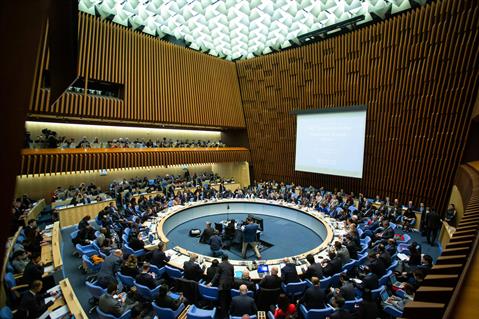
Co-sponsored by 20 Member States and the EU, the draft resolution for the Seventy-Third World Health Assembly (WHA) was presented on 5 February, 2020, at EB146.
The proposal followed Executive Board Members’ review of the Director-General’s report.
The proposed resolution recommends that the World Health Assembly adopt the global strategy to accelerate the elimination of cervical cancer as a public health problem and its associated goals and targets for the period 2020–2030. It also urges Member States to implement the strategy, calling for the support of international organizations and other relevant stakeholders, and includes a request for the Director General to support Member states in this endeavor. The WHA will consider the resolution when it convenes in May 2020.
The session included 23 interventions from EB Member States, most of them in full support of the Strategy and resolution; 18 from other Member States, 6 observers and 6 non-state actors.
Australia opened the round of interventions, expressing support for the global efforts as well as the work of the Secretariat and Dr Nono Simelela. It followed by presenting, on behalf also of the 46 countries co-sponsoring, the draft text resolution, underscoring the need to scale up implementation of the Global Strategy for the elimination of cervical cancer as a public health problem in order to address the disproportional impact of cervical cancer on the most vulnerable.
Interventions fully supporting the strategy and the resolution were made by Benin, and United Arab Emirates, on behalf of their respective regions (AFRO and EMRO), Similarly, Germany’s full support statement was delivered on behalf of the EU and aligned with an additional six countries. Some countries emphasized the need to overcome specific challenges that might hinder implementation, such as socio-cultural barriers and lack of political commitment. Many countries raised concerns about vaccine access challenges.
There was widespread appreciation for the Secretariat’s efforts to achieve broad consultations towards the draft strategy, while many reiterated their commitment to ending cervical cancer as a public health problem and praised the Strategy’s alignment with principles of universal health coverage (UHC).
Many non-EB Member States co-sponsors of the resolution also took the floor, such as Peru, Colombia, Norway, Canada, Malaysia and Montenegro. Observers such as Gavi and UNAIDS supported the call to action and also appreciated the broad collaboration amongst UN agencies and partners towards the Strategy.
Dr Nono Simelela, ADG and Special Adviser to WHO Director-General Dr Tedros responded at the end of the session, thanking delegates for the broad support, and addressing some of the comments by sharing some of the ongoing work such as the efforts with the immunization partners to address HPV vaccine supply challenges and transparency in pricing.
